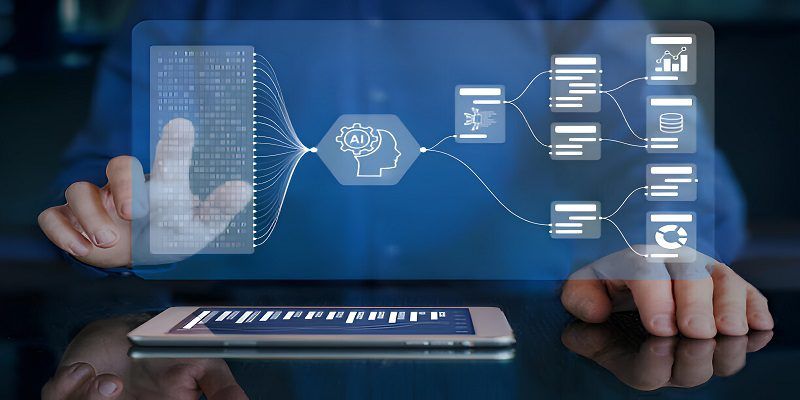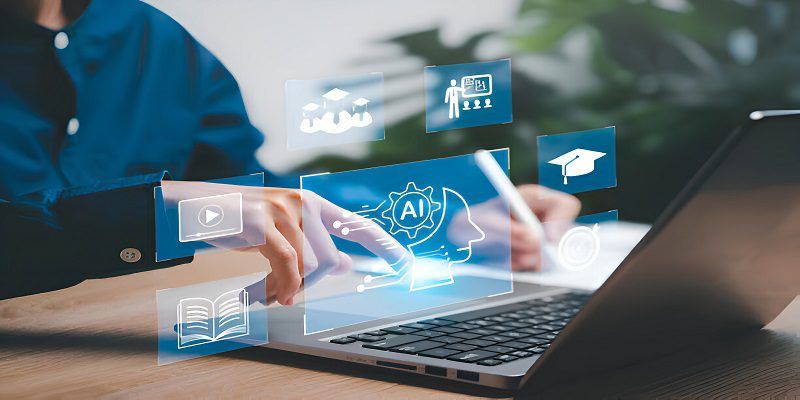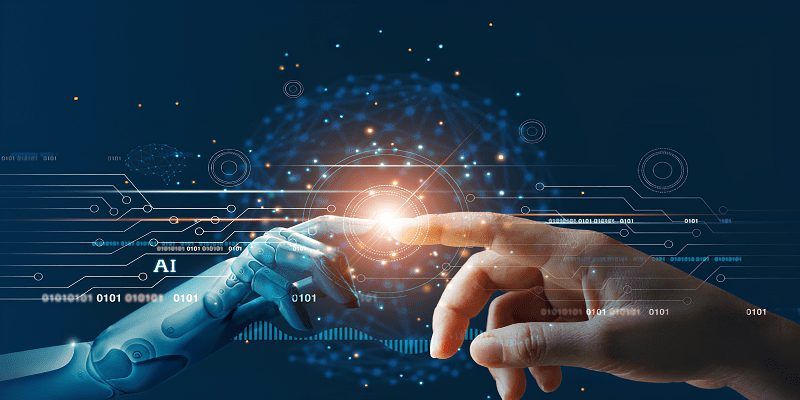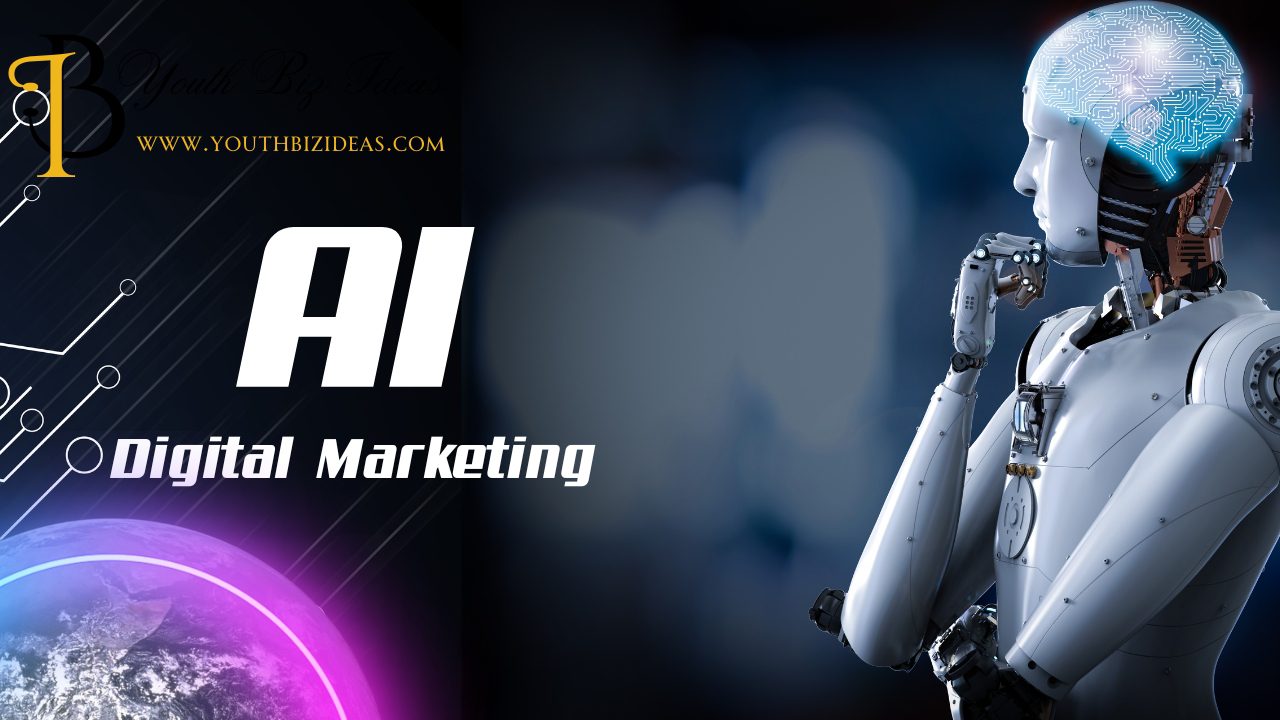Dear friends,
If you enjoyed this article, your presence and support are valuable to us. With your support, we can provide better content and smooth the path of growth and development.
Any help from you allows us an opportunity to progress. We sincerely thank you for your unwavering kindness and generosity.
You can support us via PayPal or by connecting your digital wallet to donate with cryptocurrency. Thank you for being part of our mission!
Select a wallet to accept donation in ETH, BNB, BUSD etc..






Digital Marketing has been transformed by Artificial Intelligence (AI). Businesses today leverage artificial intelligence to enhance their marketing strategies and drive better results.
In this critical technology.
AI in Digital Marketing refers to the simulation of human intelligence by machines programmed to think and learn like humans. Data analysis, speech recognition, problem-solving, and decision-making are some of the tasks that intelligent systems can perform.
It plays a crucial role in AI in Digital Marketing by enabling businesses to analyze vast amounts of data, automate tasks, personalize customer experiences, and improve overall marketing effectiveness.
It helps marketers gain valuable insights, make data-driven decisions, and optimize their marketing campaigns for better results.
AI-powered Digital Marketing technologies enable businesses to provide personalized and tailored customer experiences. AI algorithms analyze customer data and behavior patterns to provide targeted content, product recommendations, and customized offers, enhancing the customer experience.
By analyzing large datasets, AI algorithms can identify customer segments, preferences, and purchasing patterns. Marketers can use this information to create highly targeted and personalized marketing campaigns that resonate with their target audience, leading to higher conversion rates and ROI.
AI can process vast amounts of data in real-time, enabling marketers to extract valuable insights and trends. By automating data analysis, AI algorithms can identify patterns, predict customer behavior, and optimize marketing strategies for better performance.
AI-powered advertising platforms, such as programmatic advertising, enable marketers to automate ad-buying and optimize campaign performance.
AI algorithms can analyze user data and behavior to deliver ads to the right audience at the right time, maximizing ad spend efficiency and driving better results.
The use of AI in digital marketing raises concerns regarding data privacy and security. As AI algorithms collect and analyze vast amounts of customer data, businesses must ensure compliance with privacy regulations and implement robust security measures to protect customer information.
AI algorithms make decisions based on patterns and predictions, which may raise ethical concerns. Marketers must be mindful of potential biases and unintended consequences when implementing AI in their marketing strategies. It is essential to ensure transparency, fairness, and accountability in AI-driven marketing practices.
AI algorithms heavily rely on high-quality data to deliver accurate insights and predictions. Marketers must invest in data collection, cleansing, and validation processes to ensure the reliability and accuracy of the data used by AI systems.
While AI automates many marketing tasks, it still requires skilled professionals to design, implement, and monitor AI-driven marketing strategies. Marketers need to deeply understand AI technologies and constantly update their skills to leverage AI effectively.
Before diving into AI in digital marketing, it’s crucial to establish clear goals and objectives. Think of this as setting your destination before starting a journey. Are you aiming to enhance customer engagement? You can boost conversion rates or streamline your advertising efforts. Having specific, measurable goals will guide your AI strategy, ensuring every step you take aligns with your overarching business objectives. For instance, if your goal is to improve customer engagement, you might focus on AI tools like chatbots and personalized content recommendations.
To choose the right AI tools for digital marketing, you should first understand your specific needs. Evaluate features of different tools, such as data analysis, content creation, or customer segmentation. Consider integration with existing systems for smooth workflows. Choose tools that can grow with your business, adapt to new trends, and be user-friendly. Look for intuitive designs and good customer support. Finally, balance the tool’s capabilities with your budget to ensure a good return on investment. Remember, the most expensive model may only sometimes be the best fit for your needs.
Data is the fuel that powers AI. To leverage AI in digital marketing effectively, you need high-quality, relevant data. This involves collecting data from various sources like customer interactions, social media, website analytics, and sales records. Once collected, this data must be cleaned and organized to ensure its accuracy and reliability. Think of data as raw ingredients in a recipe; without fresh, quality ingredients, the result won’t be satisfactory. AI algorithms can then analyze this data to uncover patterns, predict trends, and provide actionable insights, helping you make informed marketing decisions.
Integrating AI with your existing marketing systems can be likened to adding a turbocharger to a car. It should enhance performance without causing disruptions. Start by evaluating your current technology stack to ensure compatibility with AI tools. Seamless integration means AI can work alongside your CRM, CMS, and other marketing platforms, enabling a smooth flow of data and automation. This step is vital for maximizing efficiency and ensuring that AI-driven insights and automation are effectively implemented across all marketing channels.

The future of AI in digital marketing holds exciting possibilities that promise to reshape the landscape of customer engagement and brand interactions. Let’s delve deeper into the key areas where AI is expected to make significant strides:
As AI continues to evolve, so does its ability to interpret and analyze complex data sets. Machine learning algorithms are becoming more sophisticated, enabling marketers to glean more profound insights into consumer behavior and preferences. This empowers businesses to tailor their marketing strategies with unprecedented precision, ensuring that every interaction with customers is meaningful and impactful.
Gone are the days of one-size-fits-all marketing messages. With AI-driven hyper-personalization, brands can deliver content and offers that resonate on an individual level. By leveraging data points such as browsing history, purchase behavior, and demographic information, marketers can create highly targeted campaigns that speak directly to the unique needs and interests of each customer.
With the rise of voice assistants and visual search technologies, AI is poised to revolutionize how consumers discover and interact with brands online. Voice search optimization and visual recognition algorithms enable businesses to optimize their content for these emerging channels, ensuring maximum visibility and engagement in an increasingly voice-driven and visually oriented digital landscape.
AI-powered automation tools are streamlining repetitive tasks such as email marketing, social media management, and campaign optimization. By automating these routine processes, marketers can free up time to focus on more strategic initiatives, driving innovation and creativity in their digital marketing efforts.
AI in Digital Marketing is transforming how businesses connect with their audience, making interactions more personal and efficient. Let’s break down the critical AI-powered tools that are revolutionizing the industry:
Imagine having a tireless assistant who never sleeps. That’s what chatbots are for your digital marketing. They can handle customer queries 24/7, provide instant responses, and even guide users through their purchase journey. By simulating human conversation, chatbots improve customer satisfaction and free up your team to focus on more complex tasks.
Have you ever wished you had a crystal ball to foresee customer behavior? Predictive analytics is close. By analyzing historical data, AI can predict future trends, helping marketers anticipate customer needs and tailor their strategies accordingly. It’s like having a roadmap to your customers’ future desires, allowing for more effective and targeted marketing campaigns.
Creating engaging content can be time-consuming, but AI tools are here to help. These tools can generate articles, social media posts, and even video scripts based on your specifications. They use natural language processing to ensure the content is relevant and engaging. Think of it as having a creative partner who always has ideas.
With the rise of smart speakers and voice assistants, optimizing for voice search is crucial. AI can help by analyzing voice search trends and keywords, ensuring your content is easily discoverable when users speak rather than type. It’s like tuning your marketing strategy to the frequency of your audience’s voices, making your brand more accessible in the age of Alexa and Siri.
Managing social media effectively requires constant monitoring and engagement. AI tools can schedule posts, analyze performance metrics, and even automate responses to common queries. They act like a social media manager who works around the clock, ensuring your brand remains active and responsive on all platforms.

In the realm of digital marketing, the integration of AI with SEO strategies has become indispensable for businesses aiming to thrive in the competitive online landscape. Here’s a detailed breakdown of how AI is influencing various aspects of SEO:
AI-powered tools analyze vast datasets to identify relevant keywords based on search trends, user intent, and competitor analysis. These tools not only identify high-potential keywords but also suggest optimal keyword placement and density, ensuring content aligns with user queries effectively.
AI algorithms assist in content optimization by analyzing user engagement metrics, search trends, and competitor strategies. By leveraging AI, marketers can refine their content strategies, enhance readability, and ensure content relevance to target audiences, thereby improving search engine rankings and organic traffic.
With the rise of voice search, AI-driven algorithms play a crucial role in optimizing content for natural language queries. By analyzing conversational patterns and user intent, AI helps secure featured snippets, increasing visibility in search results and driving organic traffic.
AI facilitates real-time rank tracking and comprehensive analysis of SEO performance metrics. These AI-driven insights enable marketers to identify emerging trends, track competitors’ strategies, and make data-driven decisions to adapt their SEO tactics effectively.
AI plays a vital role in improving user experience on websites. AI algorithms can analyze user behavior, identify pain points, and suggest improvements to website navigation, page load speed, mobile responsiveness, and overall user interface. This results in better user engagement and increased conversion rates.
In the fast-changing world of digital marketing, the interplay between AI and SEO is transforming how businesses engage with their audience. Leveraging AI-driven technologies, marketers can seize unprecedented opportunities to optimize their online presence, improve user experiences, and foster sustainable growth.
AI empowers marketers to delve deep into data analytics, revealing valuable insights into consumer behavior, preferences, and trends. Equipped with this knowledge, businesses can tailor their marketing strategies precisely, delivering personalized content and experiences that resonate with their target audience.
Furthermore, AI-powered tools streamline and automate various aspects of SEO, including keyword research, content optimization, rank tracking, and analysis. By harnessing AI solutions, marketers can navigate the complexities of search engine algorithms with agility and finesse, ensuring maximum visibility and engagement across digital channels.
As AI continues to advance, it offers limitless opportunities for innovation and growth in digital marketing. Embracing AI-driven strategies allows businesses to stay ahead of the curve, adapt to evolving market dynamics, and gain a competitive edge in the digital landscape.

AI revolutionizes digital marketing strategies by enabling personalized experiences, efficient data analysis, streamlined advertising campaigns, and improved targeting. It helps marketers make data-driven decisions and optimize their marketing efforts for better results.
Implementing AI in digital marketing comes with challenges, such as privacy concerns, ethical considerations, dependency on data quality, and the need for skilled professionals. Businesses must address these challenges to ensure responsible and effective AI implementation.
Although AI automates many marketing tasks, it cannot replace human marketers entirely. AI complements human expertise by automating routine tasks and providing valuable insights. Human marketers bring creativity, strategic thinking, and emotional intelligence that AI cannot replicate.
Some popular AI tools in digital marketing include chatbots for customer engagement, predictive analytics for data-driven insights, image recognition for visual search optimization, and natural language processing for voice assistants and sentiment analysis.
To prepare for the future of AI in digital marketing, businesses should stay updated on AI advancements, invest in AI training for their marketing teams, foster a culture of innovation and adaptability, and continuously evaluate and optimize their AI strategies based on data and results.
Dear friends,
If you enjoyed this article, your presence and support are valuable to us. With your support, we can provide better content and smooth the path of growth and development.
Any help from you allows us an opportunity to progress. We sincerely thank you for your unwavering kindness and generosity.
You can support us via PayPal or by connecting your digital wallet to donate with cryptocurrency. Thank you for being part of our mission!
Select a wallet to accept donation in ETH, BNB, BUSD etc..




Your support makes our journey smoother. Every contribution creates an opportunity for growth and progress. We sincerely appreciate your kindness and generosity.

Don’t miss this!
You’ll love this post too—click and discover something amazing! 🚀
📌 Advanced SEO Article Prompt for Long-Form Content
✅ 12 structured headings & subheadings
✅ 5 ready-to-go FAQs
✅ SEO titles, tags, meta descriptions
Perfect for marketers, bloggers, and SEO freelancers.
📦 Download now and own your niche!
Want long-form content that ranks AND engages?
⚡ One prompt = +10,000 words of SEO gold.
🧠 Write like a pro with zero effort!
Just drop your topic into this prompt and watch SEO magic happen.
Write smarter, not harder!
📦 Download now and own your niche!
3 Responses
Если нужны тематические площадки, выбирайте базы форумов xrumer, соответствующие вашей нише.
Sur la plateforme Bed and Bamboo vous profitez de des options de personnalisation et un eventail de choix de salles de videoconference. Precisement ici vous obtiendrez la possibilite savourer des interactions video efficaces. Inscrivez-vous sur la plateforme Bed and Bamboo et debutez vos echanges video Coco chat deja sans delai ! Coco chat, Chatrandom, Chatrandom, Chatrandom nettchat, Monkey, omegle-alternativen, omegle-alternativen, chillplanet, chatplaza 2025
Coco chat
Chatrandom
Chatrandom
Chatrandom
nettchat
monkey
omegle-alternativen
omegle-alternatives
chillplanet
chatplaza
Do you need funds to run your business smooth? We will provide loans and skyrocket growth and supercharge returns on your business.
Now you have the Chance to Obtain Financing for your Businesses and Ventures free from pressure and any obligation of repayment as our first focus lies in nurturing the growth of your business and projects, allowing you to realize your desired business goals and dreams.
Take advantage of our fast Financing offer and get funding for your enterprise and projects within days, with a generous number of years to the loan term period, giving you sufficient time to grow and attain your business goals.
We are a registered and reputable HK company with international accreditation.
Please reply to: customersupport@capitalfund-hk.com
or
Get in touch with us at: +852 3008 8373
Unsubscribe here if you don’t want to get these amazing offers: https://form.jotform.com/241311404065442
Vejlebaksvej 71, Watertown, New York, USA, 5750